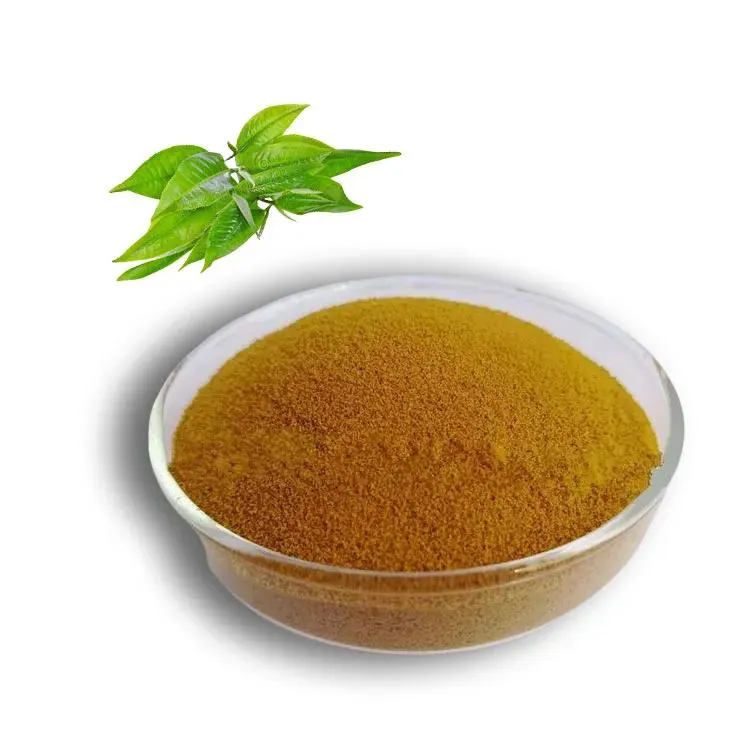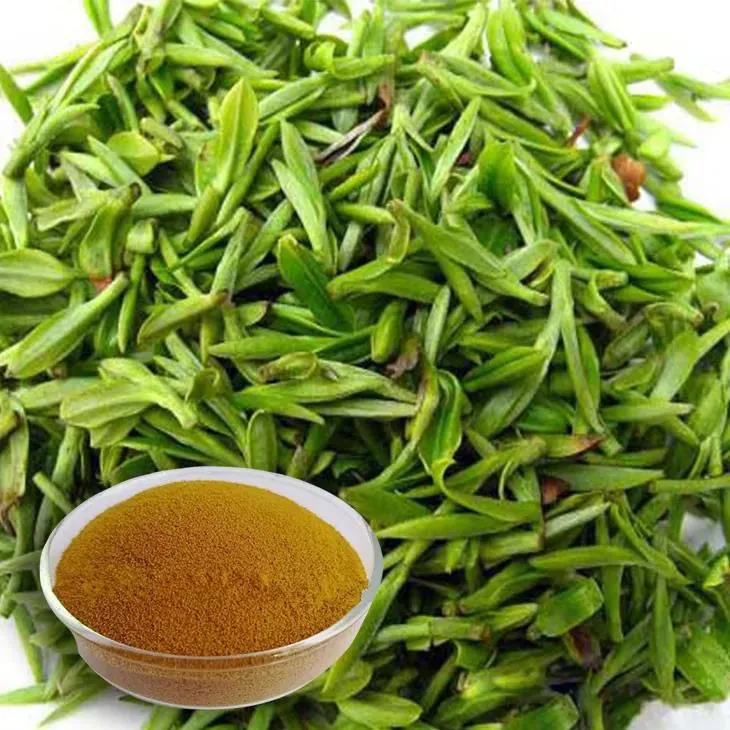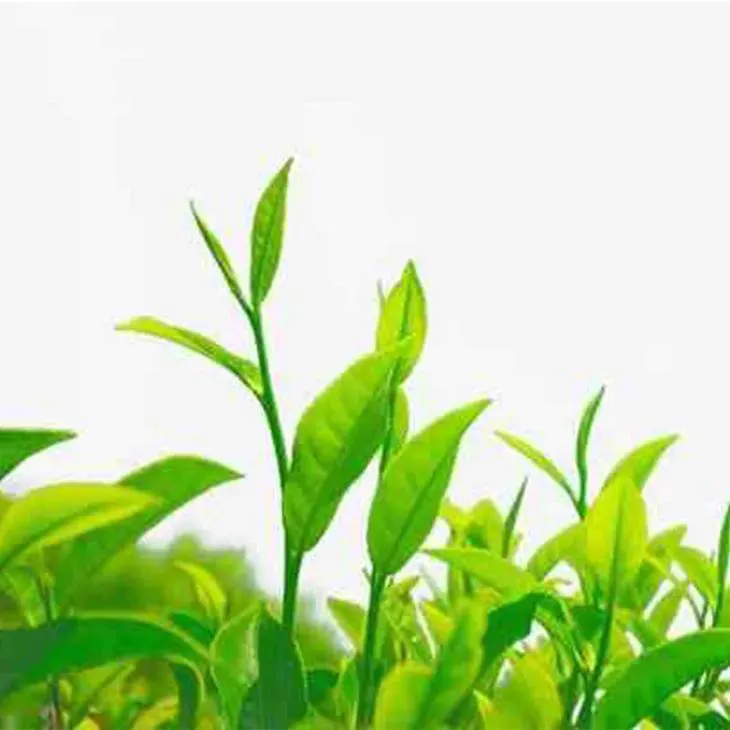- 0086-571-85302990
- sales@greenskybio.com
The best organic green tea extract.
2024-11-30

Sustainable Cultivation of Green Tea Plants for Extraction
Organic Green Tea Extract begins with the sustainable cultivation of green tea plants. Sustainability in this context is not just a trendy term but a crucial aspect that encompasses environmental and ethical considerations.
Green tea plants are typically grown in regions with specific climatic conditions. For example, in Asia, countries like China and Japan have long - standing traditions of green tea cultivation. In these areas, farmers are increasingly adopting sustainable practices. One such practice is the use of natural fertilizers like compost and manure. This helps in maintaining the soil fertility without the use of harmful chemical fertilizers that can leach into the soil and water sources.
Another important aspect of sustainable cultivation is water management. Green tea plants require an appropriate amount of water, and farmers are now using techniques such as drip irrigation. This method ensures that water is delivered directly to the roots of the plants, minimizing water wastage. Additionally, it helps in preventing soil erosion, which is a significant environmental concern in many agricultural areas.
From an ethical perspective, fair labor practices are an integral part of sustainable green tea cultivation. Workers are paid fair wages, and they are provided with safe working conditions. This not only benefits the workers but also ensures the quality of the green tea produced. Happy and well - taken - care - of workers are more likely to handle the plants with care during the cultivation and harvesting processes.

Potential in Promoting Heart Health
The best organic Green Tea Extract has significant potential in promoting heart health. One of the key components in green tea that contributes to this is catechins. Catechins are a type of antioxidant that has been shown to have multiple beneficial effects on the heart.
Studies have found that catechins can help in reducing LDL cholesterol levels, also known as "bad" cholesterol. High levels of LDL cholesterol are a major risk factor for heart disease. By reducing these levels, Green Tea Extract can play a role in maintaining a healthy lipid profile.
Additionally, green tea extract may also help in reducing blood pressure. High blood pressure is another common risk factor for heart problems. The mechanisms through which it does this are complex and may involve the relaxation of blood vessels. When blood vessels are relaxed, the blood can flow more easily, reducing the pressure on the heart.
Another way in which green tea extract promotes heart health is through its anti - inflammatory properties. Inflammation in the body, especially in the blood vessels, can contribute to the development of atherosclerosis, a condition where plaque builds up in the arteries. By reducing inflammation, green tea extract can help in preventing this build - up and thus protect the heart.

Potential in Promoting Cognitive Function
The unique combination of nutrients in the best organic green tea extract also makes it a potential promoter of cognitive function. One of the main components involved in this is L - theanine, an amino acid found in green tea.
L - theanine has been shown to have a relaxing effect on the brain. It can cross the blood - brain barrier and increase the production of alpha - waves in the brain. These alpha - waves are associated with a state of relaxation and focus. In a world filled with distractions, the ability to relax and focus is crucial for cognitive performance.
Green tea extract also contains antioxidants like catechins, which can protect the brain cells from oxidative stress. Oxidative stress is caused by free radicals in the body, and it can damage cells, including brain cells. By protecting the brain cells, green tea extract can help in maintaining cognitive function as we age.
Some studies have also suggested that green tea extract may have a role in improving memory. The exact mechanisms are still being studied, but it is thought that the combination of L - theanine and other components in green tea extract may be involved in enhancing synaptic plasticity, which is important for memory formation and retention.

Distinct Characteristics from Different Regions' Green Tea Varieties
Different regions' green tea varieties result in distinct characteristics in the extract. For example, Japanese green tea is known for its delicate and grassy flavor. This is due in part to the specific cultivars of green tea plants used in Japan and the unique climate and soil conditions.
In contrast, Chinese green tea has a wider range of flavors. Some Chinese green teas, like Longjing (Dragon Well), have a nutty and sweet flavor. The differences in flavor are reflected in the chemical composition of the green tea extract. Different cultivars and growing conditions can lead to variations in the levels of catechins, L - theanine, and other components.
Green tea from India also has its own characteristics. Indian green tea, often grown in regions with different altitudes and climates compared to Asian countries, may have a more robust flavor. These differences can also impact the potential health benefits of the green tea extract. For example, the levels of antioxidants may vary depending on the region of origin.
When it comes to choosing the best organic green tea extract, understanding these regional differences can be very helpful. It allows consumers to select an extract that suits their taste preferences as well as their desired health benefits.
Tips on Choosing the Best Organic Green Tea Extract in a Market Flooded with Options
In a market flooded with options, choosing the best organic green tea extract can be a daunting task. Here are some tips to help you make an informed decision:
1. Check for Organic Certification
Look for products that have been certified as organic. This ensures that the green tea plants used for extraction were grown without the use of synthetic pesticides, fertilizers, or genetically modified organisms (GMOs). Organic certification also indicates that the extraction process was carried out in an environmentally friendly and sustainable manner.
2. Look at the Ingredient List
Check the ingredient list carefully. The best organic green tea extract should contain only high - quality green tea extract as the main ingredient. Avoid products that have a lot of added fillers, artificial colors, or flavors.
3. Consider the Source
As we have discussed, different regions produce green tea with different characteristics. Consider where the green tea used for the extract is sourced from. If you prefer a certain flavor or are interested in specific health benefits associated with a particular region's green tea, choose an extract accordingly.
4. Check for Purity and Potency
Look for information on the purity and potency of the green tea extract. Higher - quality extracts will typically have a higher concentration of active ingredients such as catechins and L - theanine. Some products may also provide information on the extraction method used, which can affect the purity and potency of the extract.
5. Read Customer Reviews
Reading customer reviews can be a great way to get an idea of the quality and effectiveness of a particular organic green tea extract. Look for reviews on reliable e - commerce platforms or health - related websites. Pay attention to both positive and negative reviews to get a balanced view.
FAQ:
What are the environmental benefits of sustainable cultivation in organic green tea extract production?
Sustainable cultivation in organic green tea extract production offers several environmental benefits. It helps in conserving soil quality as it reduces the use of synthetic fertilizers and pesticides that can degrade the soil. It also promotes biodiversity as it allows for a more natural ecosystem around the tea plants. This type of cultivation often involves methods like crop rotation and inter - cropping which can enhance the overall health of the farming area. Additionally, sustainable practices can lead to better water conservation as they typically involve more efficient irrigation methods.
How does organic green tea extract promote heart health?
Organic green tea extract promotes heart health through multiple mechanisms. It contains compounds such as catechins, particularly epigallocatechin - 3 - gallate (EGCG). These catechins have antioxidant properties which can help reduce oxidative stress in the body. Oxidative stress is linked to various heart - related problems. Green tea extract may also help in reducing bad cholesterol levels (LDL) and triglycerides, while potentially increasing good cholesterol (HDL). Moreover, it can have anti - inflammatory effects, which is beneficial for the heart as inflammation is associated with heart diseases.
What role does it play in cognitive function?
The organic green tea extract can play a significant role in cognitive function. The catechins in it may cross the blood - brain barrier. Once in the brain, they can have antioxidant and anti - inflammatory effects. These actions can help protect brain cells from damage. Green tea extract may also enhance neurotransmitter function, such as increasing dopamine levels. This can lead to improved focus, memory, and overall cognitive performance. Some studies suggest that it may even have a role in reducing the risk of neurodegenerative diseases like Alzheimer's and Parkinson's.
How do different green tea varieties from various regions affect the characteristics of the extract?
Different green tea varieties from various regions can significantly affect the characteristics of the extract. For example, the soil composition, altitude, climate, and sunlight exposure in different regions can influence the chemical composition of the tea leaves. Tea plants grown in high - altitude regions may produce leaves with higher levels of certain antioxidants. The type of tea variety also matters. For instance, Japanese green tea varieties like Sencha may have a different flavor profile and nutrient composition compared to Chinese varieties like Longjing. These differences in the source tea will be reflected in the characteristics of the green tea extract, such as its taste, aroma, and the potency of its health - promoting compounds.
What tips can you give for choosing the best organic green tea extract in a competitive market?
When choosing the best organic green tea extract in a competitive market, there are several tips to consider. Firstly, look for products that are certified organic by a recognized authority. This ensures that the tea plants were grown without synthetic pesticides and fertilizers. Check the ingredient list for purity, and avoid products with added fillers or artificial flavors. Consider the extraction method. CO2 extraction is often considered a high - quality method as it can preserve the beneficial compounds. Also, look at the concentration of active ingredients, such as catechins. Higher concentrations may indicate a more potent product. Read customer reviews and look for brands with a good reputation for quality and transparency.
Related literature
- The Health Benefits of Organic Green Tea Extract: A Comprehensive Review"
- "Green Tea Varieties and Their Impact on Extract Composition"
- "Sustainable Cultivation Practices in Organic Green Tea Production"
- ▶ Hesperidin
- ▶ citrus bioflavonoids
- ▶ plant extract
- ▶ lycopene
- ▶ Diosmin
- ▶ Grape seed extract
- ▶ Sea buckthorn Juice Powder
- ▶ Beetroot powder
- ▶ Hops Extract
- ▶ Artichoke Extract
- ▶ Reishi mushroom extract
- ▶ Astaxanthin
- ▶ Green Tea Extract
- ▶ Curcumin Extract
- ▶ Horse Chestnut Extract
- ▶ Other Problems
- ▶ Boswellia Serrata Extract
- ▶ Resveratrol Extract
- ▶ Marigold Extract
- ▶ Grape Leaf Extract
- ▶ blog3
- ▶ Aminolevulinic acid
- ▶ Cranberry Extract
-
The best lemon juice powder in nature.
2024-11-30
-
Organic Vitamin K2 Powder Suppliers
2024-11-30
-
Bulk purchase of L - tyrosine.
2024-11-30
-
Vitamin K2 Manufacturers
2024-11-30
-
Peppermint Oil
2024-11-30
-
Black Rice Extract
2024-11-30
-
Hops Extract
2024-11-30
-
Fig Extract
2024-11-30
-
Citrus bioflavonoids
2024-11-30
-
Hawthorn Extract
2024-11-30
-
Acerola Juice Powder
2024-11-30
-
Baicalin
2024-11-30
-
Lavender Extract
2024-11-30
-
Cat Claw Extract
2024-11-30























